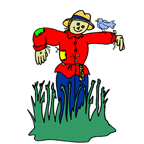 There are many fun yet highly educational therapy activities we can do with our preschool and school-aged clients in the fall. One of my personal favorites is bingo. Boggles World, an online ESL teacher resource actually has a number of ready-made materials, flashcards, and worksheets that can be adapted for speech-language therapy purposes. For example, their Fall and Halloween Bingo comes with both call out cards and a 3×3 and a 4×4 (as well as 3×3) card generator/boards. Clicking the refresh button will generate as many cards as you need, so the supply is endless! You can copy and paste the entire bingo board into a word document resize it and then print it out on reinforced paper or just laminate it. Continue reading Therapy Fun with Ready Made Fall and Halloween Bingo
There are many fun yet highly educational therapy activities we can do with our preschool and school-aged clients in the fall. One of my personal favorites is bingo. Boggles World, an online ESL teacher resource actually has a number of ready-made materials, flashcards, and worksheets that can be adapted for speech-language therapy purposes. For example, their Fall and Halloween Bingo comes with both call out cards and a 3×3 and a 4×4 (as well as 3×3) card generator/boards. Clicking the refresh button will generate as many cards as you need, so the supply is endless! You can copy and paste the entire bingo board into a word document resize it and then print it out on reinforced paper or just laminate it. Continue reading Therapy Fun with Ready Made Fall and Halloween Bingo
Category: preschoolers
Speech, Language, and Literacy Fun with Karma Wilson’s “Bear” Books
 In my previous posts, I’ve shared my thoughts about picture books being an excellent source of materials for assessment and treatment purposes. They can serve as narrative elicitation aids for children of various ages and intellectual abilities, ranging from pre-K through fourth grade. They are also incredibly effective treatment aids for addressing a variety of speech, language, and literacy goals that extend far beyond narrative production. Continue reading Speech, Language, and Literacy Fun with Karma Wilson’s “Bear” Books
In my previous posts, I’ve shared my thoughts about picture books being an excellent source of materials for assessment and treatment purposes. They can serve as narrative elicitation aids for children of various ages and intellectual abilities, ranging from pre-K through fourth grade. They are also incredibly effective treatment aids for addressing a variety of speech, language, and literacy goals that extend far beyond narrative production. Continue reading Speech, Language, and Literacy Fun with Karma Wilson’s “Bear” Books
Using Picture Books to Teach Children That It’s OK to Make Mistakes and Take Risks
 Those of you who follow my blog know that in my primary job as an SLP working for a psychiatric hospital, I assess and treat language and literacy impaired students with significant emotional and behavioral disturbances. I often do so via the aid of picture books (click HERE for my previous posts on this topic) dealing with a variety of social communication topics. Continue reading Using Picture Books to Teach Children That It’s OK to Make Mistakes and Take Risks
Those of you who follow my blog know that in my primary job as an SLP working for a psychiatric hospital, I assess and treat language and literacy impaired students with significant emotional and behavioral disturbances. I often do so via the aid of picture books (click HERE for my previous posts on this topic) dealing with a variety of social communication topics. Continue reading Using Picture Books to Teach Children That It’s OK to Make Mistakes and Take Risks
Speech, Language, and Literacy Fun with Helen Lester’s Picture Books
 Picture books are absolutely wonderful for both assessment and treatment purposes! They are terrific as narrative elicitation aids for children of various ages, ranging from pre-K through fourth grade. They are amazing treatment aids for addressing a variety of speech, language, and literacy goals that extend far beyond narrative production. Continue reading Speech, Language, and Literacy Fun with Helen Lester’s Picture Books
Picture books are absolutely wonderful for both assessment and treatment purposes! They are terrific as narrative elicitation aids for children of various ages, ranging from pre-K through fourth grade. They are amazing treatment aids for addressing a variety of speech, language, and literacy goals that extend far beyond narrative production. Continue reading Speech, Language, and Literacy Fun with Helen Lester’s Picture Books
Assessing Social Pragmatic Abilities in Children with Language Difficulties
You’ve received a referral to assess the language abilities of a school aged child with suspected language difficulties. The child has not been assessed before so you know you’ll need a comprehensive language test to look at the child’s ability to recall sentences, follow directions, name words, as well as perform a number of other tasks showcasing the child’s abilities in the areas of content and form (Bloom & Lahey, 1978).
But how about the area of language use? Will you be assessing the child’s pragmatic and social cognitive abilities as well during your language assessment? After all most comprehensive standardized assessments, “typically focus on semantics, syntax, morphology, and phonology, as these are the performance areas in which specific skill development can be most objectively measured” (Hill & Coufal, 2005, p 35). Continue reading Assessing Social Pragmatic Abilities in Children with Language Difficulties
On the Disadvantages of Parents Ceasing to Speak the Birth Language with Bilingual Language Impaired Children
 Despite significant advances in the fields of education and speech pathology, many harmful myths pertaining to multilingualism continue to persist. One particularly infuriating and patently incorrect recommendation to parents is the advice to stop speaking the birth language with their bilingual children with language disorders. Continue reading On the Disadvantages of Parents Ceasing to Speak the Birth Language with Bilingual Language Impaired Children
Despite significant advances in the fields of education and speech pathology, many harmful myths pertaining to multilingualism continue to persist. One particularly infuriating and patently incorrect recommendation to parents is the advice to stop speaking the birth language with their bilingual children with language disorders. Continue reading On the Disadvantages of Parents Ceasing to Speak the Birth Language with Bilingual Language Impaired Children
FREE Resources for Working with Russian Speaking Clients: Part II
A few years ago I wrote a blog post entitled “Working with Russian-speaking clients: implications for speech-language assessment” the aim of which was to provide some suggestions regarding assessment of bilingual Russian-American birth-school age population in order to assist SLPs with determining whether the assessed child presents with a language difference, insufficient language exposure, or a true language disorder.
Today I wanted to provide Russian speaking clinicians with a few FREE resources pertaining to the typical speech and language development of Russian speaking children 0-7 years of age.
Below materials include several FREE questionnaires regarding Russian language development (words and sentences) of children 0-3 years of age, a parent intake forms for Russian speaking clients, as well as a few relevant charts pertaining to the development of phonology, word formation, lexicon, morphology, syntax, and metalinguistics of children 0-7 years of age.
It is, however, important to note that due to the absence of research and standardized studies on this subject much of the below information still needs to be interpreted with significant caution.
Select Speech and Language Norms:
- Некоторые нормативы речевого развития детей от 18 до 36 месяцев (по материалам МакАртуровского опросника) (Number of words and sentence per age of Russian speakign children based on McArthur Bates)
- Речевой онтогенез: Развитие Речи Ребенка В Норме 0-7 years of age (based on the work of А.Н. Гвоздев) includes: Фонетика,Словообразование, Лексика, Морфолог-ия, Синтаксис, Метаязыковая деятельность (phonology, word formation, lexicon, morphology, syntax, and metalinguistics)
- Развитиe связной речи у детей 3-7 лет
a. Составление рассказа по серии сюжетных картинок
b. Пересказ текста
c. Составление описательного рассказа

Select Parent Questionnaires (McArthur Bates Adapted in Russian):
- Тест речевого и коммуникативного развития детей раннего возраста: слова и жесты (Words and Gestures)
- Тест речевого и коммуникативного развития детей раннего возраста: слова и предложения (Sentences)
- Анкета для родителей (Child Development Questionnaire for Parents)
Материал Для Родителей И Специалистов По Речевым
Нарушениям contains detailed information (27 pages) on Russian child development as well as common communication disrupting disorders
Stay tuned for more resources for Russian speaking SLPs coming shortly.
Related Resources:
- Working with Russian-speaking clients: implications for speech-language assessment
- Assessment of sound and syllable imitation in Russian speaking infants and toddlers
- Russian Articulation Screener
- Language Difference vs. Language Disorder: Assessment & Intervention Strategies for SLPs Working with Bilingual Children
- Impact of Cultural and Linguistic Variables On Speech-Language Services
It’s a Fairy Tale (Well, Almost) Therapy!
 I’ve always loved fairy tales! Much like Audrey Hepburn “If I’m honest I have to tell you I still read fairy-tales and I like them best of all.” Not to compare myself with Einstein (sadly in any way, sigh) but “When I examine myself and my methods of thought, I come to the conclusion that the gift of fantasy has meant more to me than any talent for abstract, positive thinking.”
I’ve always loved fairy tales! Much like Audrey Hepburn “If I’m honest I have to tell you I still read fairy-tales and I like them best of all.” Not to compare myself with Einstein (sadly in any way, sigh) but “When I examine myself and my methods of thought, I come to the conclusion that the gift of fantasy has meant more to me than any talent for abstract, positive thinking.”
It was the very first genre I’ve read when I’ve learned how to read. In fact, I love fairy tales so much that I actually took a course on fairy tales in college (yes they teach that!) and even wrote some of my own (though they were primarily satirical in nature).
So it was a given that I would use fairy tales as a vehicle to teach speech and language goals to the children on my caseload (and I am not talking only preschoolers either). Continue reading It’s a Fairy Tale (Well, Almost) Therapy!
Back to School SLP Efficiency Bundles™
 September is practically here and many speech language pathologists (SLPs) are looking to efficiently prepare for assessing and treating a variety of clients on their caseloads.
September is practically here and many speech language pathologists (SLPs) are looking to efficiently prepare for assessing and treating a variety of clients on their caseloads.
With that in mind, a few years ago I created SLP Efficiency Bundles™, which are materials highly useful for SLPs working with pediatric clients. These materials are organized by areas of focus for efficient and effective screening, assessment, and treatment of speech and language disorders.
A. General Assessment and Treatment Start-Up Bundle contains 5 downloads for general speech language assessment and treatment planning and includes:
- Speech Language Assessment Checklist for a Preschool Child
- Speech Language Assessment Checklist for a School-Aged Child
- Creating a Functional Therapy Plan: Therapy Goals & SOAP Note Documentation
- Selecting Clinical Materials for Pediatric Therapy
- Types and Levels of Cues and Prompts in Speech Language Therapy
B. The Checklists Bundle contains 7 checklists relevant to screening and assessment in speech language pathology
- Speech Language Assessment Checklist for a Preschool Child 3:00-6:11 years of age
- Speech Language Assessment Checklist for a School-Aged Child 7:00-11:11 years of age
- Speech Language Assessment Checklist for Adolescents 12-18 years of age
- Language Processing Deficits (LPD) Checklist for School Aged Children 7:00-11:11 years of age
- Language Processing Deficits (LPD) Checklist for Preschool Children 3:00-6:11 years of age
- Social Pragmatic Deficits Checklist for School Aged Children 7:00-11:11 years of age
- Social Pragmatic Deficits Checklist for Preschool Children 3:00-6:11 years of age
C. Social Pragmatic Assessment and Treatment Bundle contains 6 downloads for social pragmatic assessment and treatment planning (from 18 months through school age) and includes:
- Recognizing the Warning Signs of Social Emotional Difficulties in Language Impaired Toddlers and Preschoolers
- Behavior Management Strategies for Speech Language Pathologists
- Social Pragmatic Deficits Checklist for School Aged Children
- Social Pragmatic Deficits Checklist for Preschool Children
- Assessing Social Pragmatic Skills of School Aged Children
- Treatment of Social Pragmatic Deficits in School Aged Children
D. Multicultural Assessment and Treatment Bundle contains 2 downloads relevant to assessment and treatment of bilingual/multicultural children
- Language Difference vs. Language Disorder: Assessment & Intervention Strategies for SLPs Working with Bilingual Children
- Impact of Cultural and Linguistic Variables On Speech-Language Services
E. Narrative Assessment Bundle contains 3 downloads relevant to narrative assessment
- Narrative Assessments of Preschool and School Aged Children
- Understanding Complex Sentences
- Vocabulary Development: Working with Disadvantaged Populations
F. Fetal Alcohol Spectrum Disorders Assessment and Treatment Bundle contains 3 downloads relevant to FASD assessment and treatment
- Orofacial Observations of At-Risk Children
- Fetal Alcohol Spectrum Disorder: An Overview of Deficits
- Speech Language Assessment and Treatment of Children With Alcohol Related Disorders
G. Psychiatric Disorders Bundle contains 7 downloads relevant to language assessment and treatment in psychiatrically impaired children
- Recognizing the Warning Signs of Social Emotional Difficulties in Language Impaired Toddlers and Preschoolers
- Social Pragmatic Deficits Checklist for School Aged Children
- Social Pragmatic Deficits Checklist for Preschool Children
- Assessing Social Skills in Children with Psychiatric Disturbances
- Improving Social Skills of Children with Psychiatric Disturbances
- Behavior Management Strategies for Speech Language Pathologists
- Differential Diagnosis Of ADHD In Speech Language Pathology
You can find these bundles on SALE in my online store by clicking on the individual bundle links above. You can also purchase these products individually in my online store by clicking HERE.

The Importance of Narrative Assessments in Speech Language Pathology (Revised)
 As SLPs we routinely administer a variety of testing batteries in order to assess our students’ speech-language abilities. Grammar, syntax, vocabulary, and sentence formulation get frequent and thorough attention. But how about narrative production? Does it get its fair share of attention when the clinicians are looking to determine the extent of the child’s language deficits? I was so curious about what the clinicians across the country were doing that in 2013, I created a survey and posted a link to it in several SLP-related FB groups. I wanted to find out how many SLPs were performing narrative assessments, in which settings, and with which populations. From those who were performing these assessments, I wanted to know what type of assessments were they using and how they were recording and documenting their findings. Since the purpose of this survey was non-research based (I wasn’t planning on submitting a research manuscript with my findings), I only analyzed the first 100 responses (the rest were very similar in nature) which came my way, in order to get the general flavor of current trends among clinicians, when it came to narrative assessments. Here’s a brief overview of my [limited] findings. Continue reading The Importance of Narrative Assessments in Speech Language Pathology (Revised)
As SLPs we routinely administer a variety of testing batteries in order to assess our students’ speech-language abilities. Grammar, syntax, vocabulary, and sentence formulation get frequent and thorough attention. But how about narrative production? Does it get its fair share of attention when the clinicians are looking to determine the extent of the child’s language deficits? I was so curious about what the clinicians across the country were doing that in 2013, I created a survey and posted a link to it in several SLP-related FB groups. I wanted to find out how many SLPs were performing narrative assessments, in which settings, and with which populations. From those who were performing these assessments, I wanted to know what type of assessments were they using and how they were recording and documenting their findings. Since the purpose of this survey was non-research based (I wasn’t planning on submitting a research manuscript with my findings), I only analyzed the first 100 responses (the rest were very similar in nature) which came my way, in order to get the general flavor of current trends among clinicians, when it came to narrative assessments. Here’s a brief overview of my [limited] findings. Continue reading The Importance of Narrative Assessments in Speech Language Pathology (Revised)